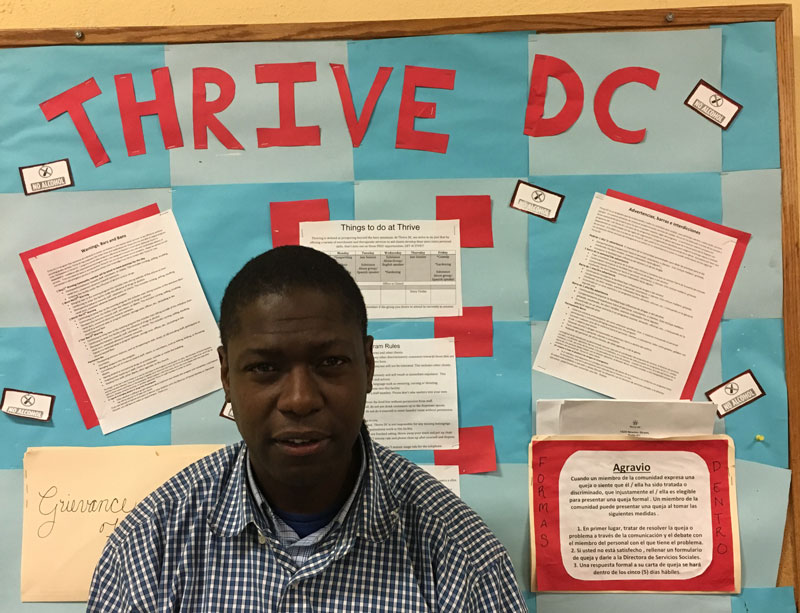The District government cut about $400,000 in funding from Thrive D.C.’s meal programming when crafting last year’s city budget. This is the first time in 10 years the organization has had to scale back one of its programs.
A lack of funding led to a decrease in staff, according to Greg Rockwell, Thrive D.C.’s community relations officer. The five-day-a-week hot-meal program was cut back to Monday-Wednesday-Friday, replacing breakfast and dinner on Tuesdays and Thursdays with sandwiches donated through a partnership with Pret A Manger. Thrive also continues to provide daily shower and laundry services, as well as personal-hygiene goods. However, Rockwell said the cuts to the meal program that brought people in the door every day have impacted Thrive’s alcohol-abuse and therapy programs, which have also been decreased from five times a week to three, following the meals served on Mondays, Wednesdays and Fridays.
Rockwell said that the counseling sessions draw fewer clients as those in need go elsewhere for their meals.
Thrive has decreased the hours that it allows clients to use the facility surrounding the meal program. Rockwell said the decrease in hours has affected clients’ ability to socialize and maintain a sense of normalcy, according to Rockwell.
“They come in, they sit down at the same spot at the same table with the same friends,” Rockwell said. “They have a cup of coffee, they could read the newspaper, they get a meal, and they get some time to breathe and relax after maybe sleeping outside all night or being in a noisy disruptive shelter.”
Reginald Charlemagne, 41, who has been relying on Thrive D.C. for meals for over a year, said that beyond the food cuts, he is particularly unhappy about having less time to hang out and use the facilities after meals. The cuts have left him with nowhere to go during the day.
“Talking with each other and also being able to feel like we have something besides the food is very important,” Charlemagne said, adding that being able to watch movies in the facility before made passing the time easier and gave him something to keep his thoughts occupied during the day.
“When you’re homeless, some of the time you can feel like, ‘I go here, I go there, I do this, but what else?’ When you come in here, the time is passing, and you don’t even feel like it’s a burden to spend the day,” Charlemagne said.
Charlemagne said the sandwiches that replaced the hot meals don’t fill many of the clients up. Some clients often will not eat another meal until 5 p.m. that day.
“We kind of suffer for food a little bit,” Charlemagne said of the new schedule. “We are allowed to have two sandwiches, and after around 11:30 a.m. or 12:00 p.m. we are very hungry.”
O.B. Black, 65, has been going to Thrive D.C. for food, showers and laundry for six years. While Black has now secured housing and does not rely on Thrive exclusively for meals, he said he worries about those individuals who may have no other places to go.
“I’m concerned about the other people who were in the position that I was in, who are depending on the meals five days a week,” Black said.
Local community support has been helpful during the past few months as the organization adjusted to its new budget, according to Rockwell.
“When we got the funding cut and we announced it, there was just a tremendous outpouring of support from the community,” Rockwell said. “Seeing the churches around us respond and seeing our community partners and our individual donors just rally behind us and say that we absolutely believe in this program and we’re going to step up to help you restore was just incredibly encouraging and heartwarming.”
Morning program assistant Brian O’Connor said the budget cuts came as a surprise and that the organization has gone through a period of adjustment while trying to figure out how best to serve its clients.
“Coming into the winter months, I was a proponent of keeping some setup where people could get coffee and sit around tables,” O’Connor said. “I figured there’s a certain aspect of socializing that I think people were willing to adjust to even if there were some big changes.”
O’Connor said that the client numbers went down slightly during the first two weeks of the transition but have been steadily increasing ever since.
“People still come and socialize, and it’s telling that even though we’ve scaled back the staff and services, that we still get healthy numbers,” O’Connor said.
Thrive D.C. mostly serves adults who are single and homeless. The cut in funds demonstrates to Rockwell that the government is choosing to prioritize other segments of the homeless population.
“We serve a lot of homeless single adults, and it’s just a population we see that is not getting the same attention or care that other populations are but is suffering just as much,” Rockwell said. “It’s frustrating to see our clients get neglected when they have very strong needs.”
D.C. Council is holding performance oversight hearings for each city agency through February and early March. The mayor’s proposed budget for fiscal year 2019 will be sent to D.C. Council by March 21.








